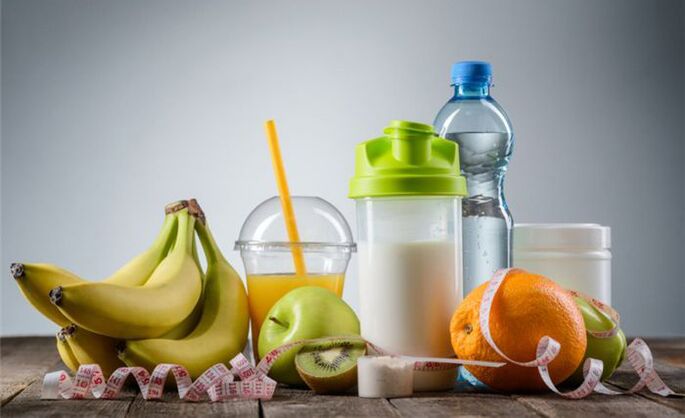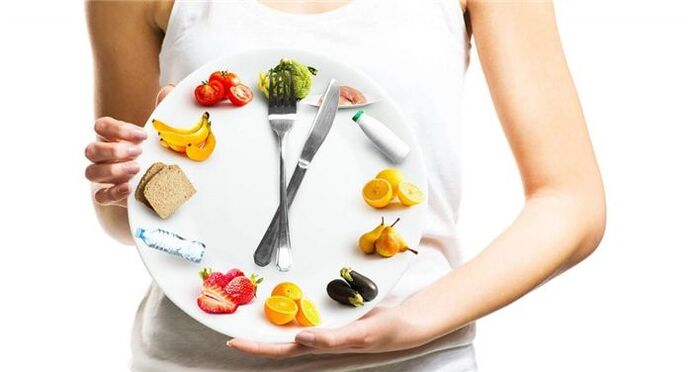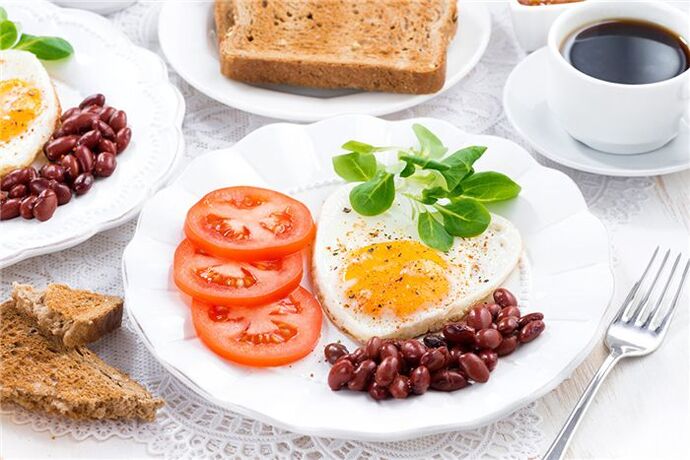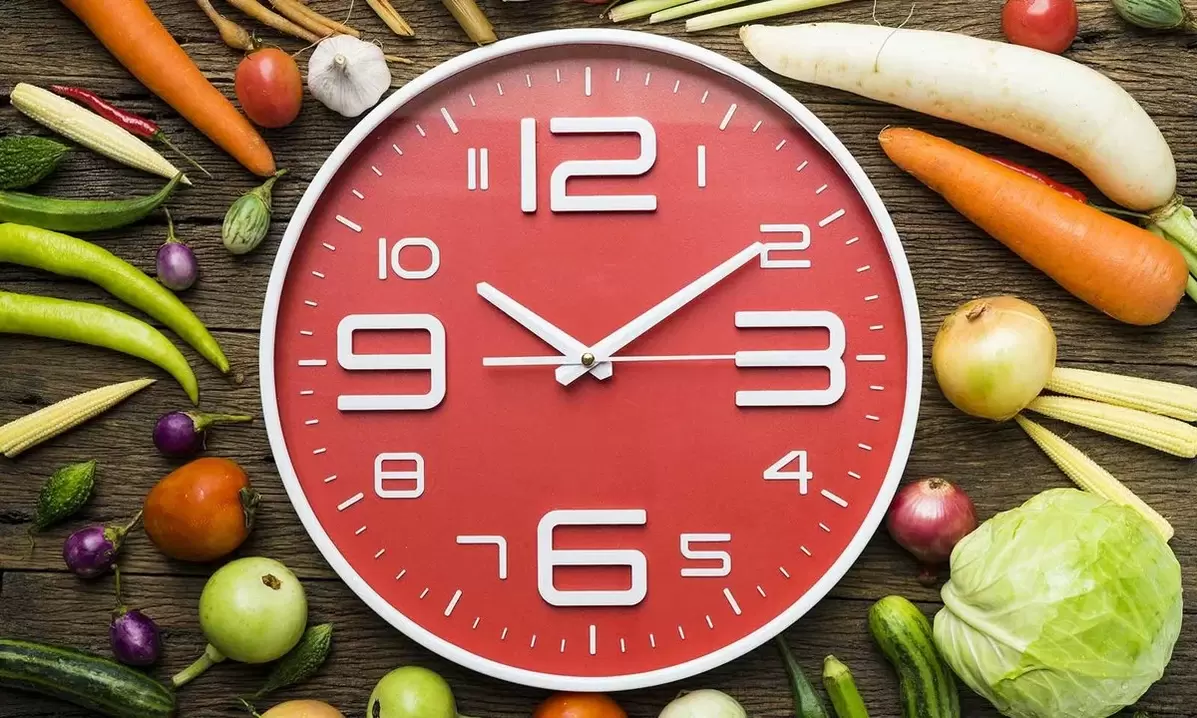
A proper nutrition (PN) diet for weight loss can be handled differently. You can criticize and find fault with it, or fanatically stick to it your whole life and enjoy your appearance. But the fact that the PP system is effective and has helped thousands of fat people who have given up is a fact that has been proven over time and confirmed by nutritionists.
Proper nutrition is not only about coleslaw and steamed fish. Millions of recipes for breakfast, lunch and dinner have been created under the PP system, many of them satisfy the needs of the body and are worth including in the proper nutrition plan of every person!
PP program
- Focus on the "food pyramid", according to which 40% of the dishes on your table should contain complex carbohydrates (this includes whole grain bread, all types of cereal products, except semolina, as well as cereals), 35% are fresh and steamed or baked vegetables andfruits, and 20% is healthy protein (lean meat, all types of poultry and fish, fermented milk and dairy products). The other 5% can come from fat and sugar.
- Mix meat with vegetables and fruits.
- If you really want it, you can have some sweets. But do not exceed the permissible limit of sugar containing products per day - 5 teaspoons. Better yet, replace sugar with honey. All desserts can only be consumed in the first half of the day to have time to burn the calories received before the evening.
- Make sure the body gets enough protein (a person needs at least 100-150 g per day). Protein is a building block that regenerates cells and maintains muscle function. If you avoid meat and poultry, you should consume plant proteins, which are abundant in legumes, nuts and soy.
- Avoid processed foods, fast food and sauces, as well as canned goods. Sugar and salt are added in large quantities even in ketchup.
Submission deadlines
Each diet can only be used for a limited time. Once results are achieved, you should switch to a healthy diet. If you start sticking to proper nutrition, you don't have to give up your favorite and unhealthy foods at all. But you should strictly control the time and amount of consumption of such products and also compensate for their calorie content with physical activity.
Proper nutrition is so healthy and beneficial that you can and even need to follow it throughout your life in the name of a slim figure and healthy appearance.
It's time to make a menu for yourself!
What kind of nutrition can be called right?
Proper nutrition (sometimes called healthy) involves eating natural foods that only benefit the body. The diet of a person who plans to eat according to this principle should include dishes that contain the necessary amount of nutrients. We are talking about the following elements:
It is necessary to count them to ensure the daily requirement. It is also important to follow other rules that make nutrition correct. Fast food, processed foods, carbonated drinks and other harmful foods should therefore not be included in your diet. It is also recommended to limit the amount of salt, exclude fried food, steam or boil, stew or bake dishes. You should eat food at the same time every day.
How to make a menu for the week
The peculiarity of proper nutrition is that it does not involve following a strict menu. It must be compiled taking into account the characteristics of the individual and his food preferences. The main thing is to follow the basic rules of combining products. We are talking about the following rules:
- breakfast should be rich in carbohydrates;
- dinner should contain a large amount of carbohydrates;
- Every meal should include foods that contain fiber (vegetables, fruits, bran);
- if you want to eat sweets, then this should be done only in the first half of the day;
- It is important to distribute calories correctly.
Usually, those who follow proper nutrition prepare a menu for the week in advance and then prepare dishes accordingly. Below is an example of such a diet, where the necessary products have already been selected. Of course, changes can be made if, for example, a person does not eat a certain type of food.
How to make a meal plan for weight loss
Individual planning of your own menu for the day, week, month will help you get used to eating right and in a strictly defined way. Portion - at least 3 times, and preferably 5-6 times a day - the diet is the key to food discipline. There is no need to break or rearrange your normal daily routine. Trust your lifestyle when creating a plan.
Meal plan for "early risers" (for example, people who wake up at 6: 00 a. m. and go to bed at 10: 00 p. m. )
- Eat breakfast at 7: 00
- 10. 00, have another light breakfast
- 13. 00 go to lunch
- 16. 00 time for afternoon tea
- Have dinner at 19. 00
Diet for "night owls" (people who get up after 9: 00 and go to bed around 00: 00)
- Have breakfast at 10. 00
- 13. 00 for lunch
- 15. 00 it's time for lunch
- 17. 00 go to afternoon tea
- At 20. 00 it's time for dinner
Thus, adjust your meal plan to your daily life.
Top recommendations
- You should eat breakfast an hour after you get up
- Drink 250 ml of warm plain water in the morning on an empty stomach.
- Allow 2-3 hours between meals
- eat dinner earlier or no later than two hours before bed
To lose weight the right way, you need to watch the calories in all the foods you eat. To do this, get a notepad or a special app on your phone and make notes even about the amount of water or juice you drink.
What is important when creating a menu
- When planning your weekly menu, immediately create a shopping list. And decide right away on which day you will cook what. On certain days, for example, chicken and fish should be included. One day you should have a light vegetable salad for dinner and a hearty roast beef for lunch etc. s. etc.
- You should not skip breakfast, even if you are not hungry. Every breakfast should be balanced and nutritious - 50% of your daily carbohydrate intake should be at breakfast, the remaining 30% for protein and 20% for fat.
- Dinner should contain mainly protein. For example, low-fat cottage cheese, baked chicken or steamed fish.
- Afternoon snacks and second breakfasts are proper and balanced between main meals. But they should not turn into a full meal. Prepare fresh fruit for a snack (you can have one banana, 150-200 g of grapes, one large apple), fresh or cooked vegetables (cabbage, tomatoes, carrots, radishes, etc. ), dried fruit or nuts (the latter should be unsaltedand not in volume). more than 30 g per serving).
- When counting calories, subtract those burned during physical activity. For example, if you plan to walk around the city all day or have planned a long-distance run, increase your diet for that day. Allow for the right amount of carbohydrates and proteins and have a good breakfast before you leave the house.
- Drink plain drinking water - not chilled or boiling water (it cleans the digestive tract and starts the metabolic process). Green tea is good for those who lose weight (it speeds up metabolism, replenishes the body's need for antioxidants and completely suppresses appetite).
- You can drink coffee, but drink high-calorie varieties (lattes or cappuccinos) only before lunch.
Failure to lose weight
- Breakdown of sweets and starchy foods (they should not be completely excluded, but portion the intake so as not to violate the norms of daily calorie intake).
- Fried and smoked. Such heat treatment of food is possible if you fry without oil, over an open fire and smoke for no longer than 20 minutes in a natural way (not with artificial smoke).
- Prefer raw vegetables and fruits to cooked and baked foods, consume a maximum of all kinds of vegetables.
- A heavy dinner with large portions. Boil or fry meat or fish, be sure to add fresh vegetables (for example, 200 g of boiled beef with one fresh cucumber).
- Frequent alcohol consumption. It should be avoided, as it is quite high in calories and can cause a strong feeling of hunger.
- You should not drink water while eating. The same goes for tea or juice. Brew a glass of tea just an hour before a meal and half an hour after.
- Be careful with salt, spices and sauces. All this greatly stimulates the appetite and can lead to disorder and overeating.
- Meals must not be skipped. Always carry a bag of nuts, water with lemon or a handful of raisins with you. In this way, you reduce your appetite and avoid overeating during a late meal.
Example of this week's menu
The first day
Breakfast: rice 200 g, butter 10 g, one banana or one apple, black coffee.
Snack: dried gray bread, boiled egg, tomatoes.
Daily meal: steamed mackerel 200 g, Chinese cabbage salad with peas and sunflower oil 180 grams.
Second snack: low-fat cottage cheese 120 g with a spoonful of 10% sour cream, green apple, 200 ml of tea.
Dinner: boiled vegetables 220 g, baked beef 140 g
Another day
Breakfast: a sandwich made of whole grain bread, creamy cottage cheese and plastic cucumber, 100 g of grapes, tea or coffee with honey.
Snack: cottage cheese 50 g with a teaspoon of honey.
Daily meal: meat stock 200 g, fresh Chinese cabbage salad with cucumber and tomatoes, seasoned with lemon juice.
Second snack: red apple and one kiwi, green or herbal tea.
Dinner: lean beef 200 g, two fresh cucumbers.
The third day
Breakfast: boiled oatmeal without milk - 210 g, a spoonful of honey, avocado and unsweetened coffee.
Snack: pine nuts or walnuts 60 g, green apple, tea, lemon slice.
Daily meal: brown rice 150 g, the same amount of steamed vegetables.
Other snack: cottage cheese made from cottage cheese, semolina, 150 g banana, herbal tea.
Dinner: 200 g peeled seafood, two cucumbers and one tomato.
Fourth day
Breakfast: oatmeal with milk 200 g, fresh raspberries, blackberries, blueberries or strawberries - 100 g.
Snack: 100 g low-fat unsweetened yogurt, a teaspoon of honey and freshly brewed black coffee.
Daily meal: baked low-fat fish 250 g, sauerkraut 130 g.
Second snack: salad of tomatoes, cucumbers, seasoned with low-fat sour cream 200 g.
Dinner: 200 g baked chicken without skin, 30 g parmesan sprinkled with two cucumbers.
Fifth day
Breakfast: 200 g of mashed potatoes in water with the addition of 30 g of butter, one boiled egg, one cucumber.
Snack: green tea and two kiwis.
Daily meal: mushroom soup with barley 260 g, dried slice of bread or crackers and 10 g of cheese.
Another snack: homemade stew made of cottage cheese, raisins and yogurt 150 g.
Dinner: baked halibut 200 g and seaweed 100 g.
Sixth day
Breakfast: scrambled omelet made from two eggs and 150 ml of milk, freshly brewed black coffee.
Snack: grapefruit or pomelo.
Daily meal: baked potatoes 150 g with champagne 100 g, baked chicken 70 g.
Second snack: kefir or low-fat drinking yogurt 200 ml, one green apple.
Dinner: reduced-fat cottage cheese 150 g without added sugar, two apples baked in the oven.
Seventh day
Breakfast: millet porridge on water 200 g with butter 30 g, a glass of black tea without sugar.
Second breakfast: kiwi and banana.
Daily meal: steamed vegetable dish + 20 g cheese - 250 g, boiled chicken fillet - 100 g.
Second snack: boiled shrimps 200 g, carrot or tomato juice 200 ml.
Dinner: steamed fish cutlet 150 g, boiled white rice 100 g, one tomato.
How to start eating right
The acceleration of life and the products that are in abundance on the shelves of stores, as well as in fast food chains, products presented by advertising, convenient to use, but not useful and often harmful, make many people think about how to start eating right and have thisitems in your daily schedule.
In addition to knowing how to portion and balance your menu efficiently, it is helpful to consider the psychological side and ensure that you have the right approach to changing your eating habits. Whatever the purpose of the diet - to realize the desire to lose weight or to improve well-being - it is very important to form the right attitude towards the problem.
Therefore, you should not:
- expect to instantly improve your health, change your eating preferences and habits completely at once;
- Divert your attention to several complex tasks at the same time;
- suddenly give up all usual food at once;
- elevating the harmonization of diet as a goal in itself and subordinating all ways of life to it;
- It is better to focus on thoughts about food to direct the energy of the mind in another useful and important direction.
Why you need to eat right
Adherence to the daily routine and diet, along with the absence of bad habits and adequate exercise, are the main conditions for keeping the body in optimal condition. Very often these simple truths are not mentioned until health problems begin, depriving a person of the opportunity to enjoy the everyday pleasures of life.
For those who are already facing problems due to lack of energy and physical strength, overweight, poor sleep, skin and hair degeneration or any of the various diseases caused by an unhealthy lifestyle, as well as those who are thinking about prevention in advance, it will be extremely important to make the decision to switch to a uniform assessment, follow it into practice, without delay.
The basis of a healthy lifestyle has been and is proper nutrition. Since it is the substances that enter the body through food that serve as the main source of strength and raw materials for the tissues of our body.
A necessary start would be to prepare a suitable diet for the day.
Rules for choosing a diet for the day

Creating a balanced menu is quite simple. Having decided to improve your health and correct your figure, you need to be careful about the quality, quantity and timing of food intake. Food should be fresh, the diet varied and properly distributed throughout the day.
- It is better to start eating more often and in small portions (not three times, but 4-6).
- Don't eat a lot before bed.
- Include vegetables in every meal.
- Drink more plain still water.
- Reduce the amount of simple carbohydrates.
Your decision to stick to a healthy diet will be rewarded with improved health, general well-being, weight loss and a boosted immunity.
The correct diet for the day should correspond to a pattern where the first meal is denser than all subsequent meals.
For beginners, it is important to gain an understanding of the substances that each body needs for normal functioning and their proportions. The key to a balanced menu is the right combination of proteins, fats and carbohydrates, as well as the presence of trace elements such as magnesium, calcium, potassium, various vitamins and iron.
Start your day with a delicious and healthy breakfast

The first thing that enters the body should be plain, not cold water (if the acidity of the stomach allows, with the addition of natural fresh lemon juice). This will help revitalize and prepare the digestive system for further activity. It is also useful for quickly removing waste products from the body, losing weight and improving the condition of the skin.
A glass of water should be consumed properly - about thirty minutes before a meal, slowly, in small sips.
Contrary to popular belief, nutritionist's advice regarding the morning meal is to exclude sweets from it. This is because when you get one dose of glucose, your body will need the next dose a little later, when the sugar that came first is processed by the digestive system.
How to choose a healthy lunch
According to nutritionists, a meal in the middle of the day should contain from 25 to 50% of the total energy value of the daily diet.
To make your lunch as healthy as possible, you should remember the following tips:
- the beginning of the meal is soup;
- drink hot (except cold) drinks;
- the interval between lunch and the previous meal should be at least 2-3 hours;
- It is helpful to balance a very hearty lunch with a light dinner.
Under no circumstances should you neglect a full lunch.
What is the best thing to eat for dinner?
An evening meal with a healthy diet contains a minimum of calories. Eating carbohydrates should be avoided. However, this meal should not be completely excluded from the regime - this causes serious disturbances in the functioning of the digestive system.
You can choose natural yogurt, steamed poultry dishes, cottage cheese and seafood.
A good choice would be a protein omelette or a small serving of legumes - beans, lentils, chickpeas.
The key to success will be a combination of foods that are rich in nutrients and low in calories.
How many calories and minerals should the body get?
Calories needed by the body are calculated using formulas that include data on the following parameters of a given person:
Particular attention should be paid to the current state of the body, professional stress, lifestyle and the goal set by a person who decides to eat right. If he is motivated by the desire to lose weight, the usual indicators are reduced by 20%; if he seeks to increase muscle mass, they are increased by the same amount.
Average standards indicate that women consume from 1000 to 2000 kcal per day, men - from 2500 to 5000. However, you need to make detailed calculations for yourself.
What foods should you avoid when creating a healthy diet?

Adapting your body to a new nutritional system takes time, just like forming any habit. If you can't eliminate all junk food at once, you should do it gradually and allow yourself something from the banned list about once a week.
This will help relieve stress and have fun. However, this weakness should be compensated for by increasing the amount of vegetables, fruits and clean drinking water.
A list that will help limit harmful foods in your diet:
- rich baked goods based on yeast and containing additives, bread and wheat bread (it would be better to give whole grains and rye without yeast);
- sweets;
- sausage products;
- mayonnaise and sauces based on it;
- canned meat and fish;
- smoked and salted meat dishes;
- egg yolk;
- foods high in animal fat;
- alcohol;
- fast food, semi-finished products;
- carbonated drinks, especially sweet ones, that contain dyes and flavorings.
It is especially important to understand the importance of freshness of products and prepared dishes. Even healthy food can be harmful if not prepared properly. Always prefer boiled and steamed to fried.
An example of the correct menu of the day
Everyone's taste preferences are individual. Moreover, it is difficult to create a menu correctly for a long time. However, once you have taken the path of correcting your diet, you will gradually learn many recipes and new dishes and you will be able to choose the ones that are most suitable for you.
A day's worth of food might look like this:
- boiled egg with buckwheat porridge for breakfast, natural cocoa as a drink, you should also add a fresh apple or orange;
- for lunch - sour soup soup, steamed, boiled or baked chicken meat without adding fat, preferably fillet, rye or rye wheat bread, green tea with honey or lemon;
- in the afternoon snack you can eat cottage cheese with fresh berries or fruit;
- A great dinner would be lean meat (uncooked) and vegetables.
For snacks, you can turn to vegetables and fruits; in case of extreme hunger, you can turn to nuts and seeds. We should not forget the daily consumption of normal water (about 2 liters) which is essential for health.
weekend
Some people believe that on weekends they can allow themselves to deviate from their diet and eat unhealthy foods that were not present in their diet on other days. This opinion is wrong, since such an act can negate all the benefits of the previous menu. Of course, sometimes you can afford something that is not very useful, but in small quantities. Heavy food can be consumed during holidays, but not every weekend.
Saturday's menu in the correct nutritional setting could look like this:
- Breakfast includes oatmeal and baked apples. You should use tea as a drink. It is important to understand that you should not put sugar in tea. If you want to sweeten the drink, it is recommended to use honey.
- Second breakfast - yogurt and banana.
- For lunch, you can prepare chicken soup with vegetables. Experts recommend choosing fish as a second course. Salad - vinaigrette. The drink is compote.
- For an afternoon snack, you can eat yogurt and add nuts to it. You can choose dried fruits instead.
- For dinner, a ham and vegetable stew would be a great option. The drink is tea.
On Sunday, you can treat yourself to cottage cheese for breakfast. It should be seasoned with honey. You can also eat toast with tea. For another breakfast, you can choose yogurt and biscuits. Lunch consists of borscht, chicken cutlet with buckwheat, compote. An excellent option for an afternoon snack, as usual, would be cottage cheese with the addition of dried fruit. For dinner, it is recommended to eat boiled veal and a vegetable salad.
What to do if you don't have enough time to cook

For those who want to eat healthy, the key to success is consistency. Only long-term lifestyle changes can have real benefits. Often the modern pace of life of a working person does not leave time for much. Under no circumstances should you give up on your determination to become healthier or your desire to lose weight.
The beginning of the journey is always the most difficult, we very often go and achieve what we want without starting, only because of limited time and energy, but there are professionals who are ready and willing to provide competent assistance.
If you do not have time to take care of your food, you can order prepared dishes for delivery, fresh and the right balance. It is very easy to choose food for yourself from the section that matches your goal (lose weight, stay in shape after dieting, increase muscle mass, etc. ). A menu is offered for the calendar and the work week with a detailed description of the composition of the products and the nutrients in them.
At your request, we will deliver healthy, fresh food that you can eat at work and at home. Comfortable service conditions allow you, without wasting time and effort in the kitchen, to enjoy a variety of balanced dishes, which you could not prepare yourself any time soon.
The opportunity to use the services offered by reputable and qualified professionals will eliminate the need to research a number of videos, view photos and read articles to expand your culinary repertoire.
There is no reason to delay starting your healthy eating plan. Do it today.














































































